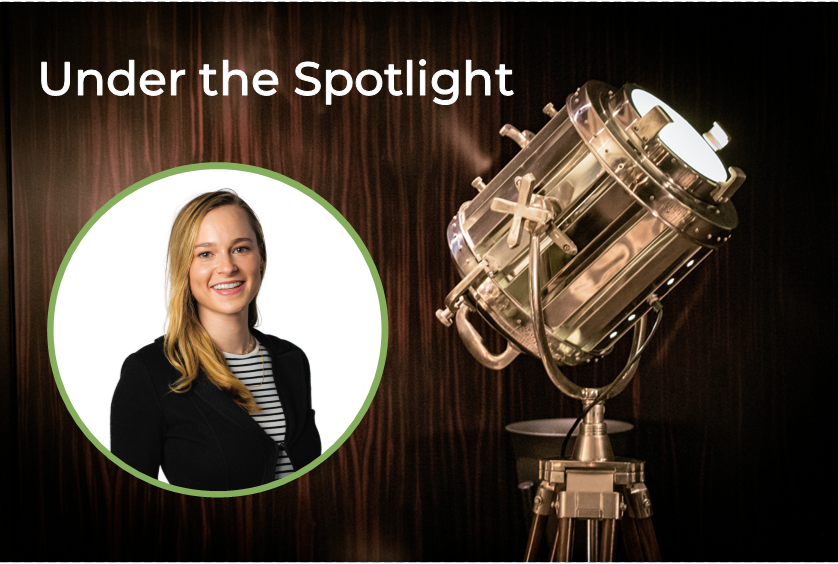Celebrating her one-year anniversary with Oakglen Wealth, our Investment Manager Eloise Rouse stands out for her strong business acumen and exceptional collaborative style. To mark this milestone, we put Eloise under the spotlight with some probing questions about her experience within the firm so far and the financial services as a whole. In this interview, she reflects on her journey, shares insights into overcoming challenges, and outlines her vision for the future of investment management, paving the way for continued growth and success.
Welcome Eloise and thanks for joining us today. Congratulations on your recent one-year anniversary with us at Oakglen Wealth. We would love to ask you a few questions about your time at the firm so far and find out more about your role as an Investment Manager (IM).
How does it feel to already have been with the company for over a year now?
Time flies when you’re having fun! It has been a busy year indeed, both in a corporate context with the launch of the UK business as well as personally, progressing from Trainee Investment Manager to Investment Manager and I have savoured every moment. I am delighted to have joined Oakglen when I did and I feel fortunate to have been able to play a part in the growth of the UK business over the last year, so I am excited to see the company’s progression continue into 2024.
What is the best thing about working at Oakglen Wealth?
I have to say, it is probably the culture of open communication. Irrespective of role, when someone has an idea of how to improve our client offering or perhaps streamline an internal process, one is encouraged to speak up and is heard. This makes it an agreeably open place to work, with all employees working together towards the same goal. Every employee is encouraged to contribute where they feel they can make a difference. I believe this is a unique trait of Oakglen and it has consequently led to an exceptionally healthy working environment. Oakglen’s company culture is extremely inclusive, and every member of our diverse team is made to feel empowered within their role, without any bias towards identity or seniority.

What is different at Oakglen Wealth (good or bad) from your last employer?
The size of the company is the biggest difference. I have found moving from a large company to a smaller firm has been the right decision for me. As a relatively newly qualified Investment Manager, I felt that at a larger company my views could be drowned out by bigger fish who may have had a few more years in the industry on their side and I might not have ever been recognised as a fully qualified IM, but still perceived as a trainee. At Oakglen, I have been able hit the ground running with building my book as an IM, as well as feel like an integral part of a growing company. Consequently, I have developed in both confidence and market knowledge over the last year. This is something I truly value about working here.
As a smaller company, we are also able to react quickly to market movements and have the flexibility to easily adapt our investment process to sudden changes in the economy. We (the Investment Managers) are given the tools to make forward-looking investment decisions based on the current market and each client’s specific circumstances, rather than being driven by historical performance and a benchmark. This is important for our clients and allows us to deliver the best performance possible.
What do you know now about the firm that you wish you had known in your first week?
How quickly the company would grow. I do not think I was wholly prepared for how quickly we would be able to expand the UK side of the business! Hence, I think that all of us in the London office would agree that, at times, we have been fully stretched and deadlines have been tight, but in consequence, we have all learnt new skills that we may never have had the opportunity to master whilst doing a similar role in a long-standing establishment. It has been an exhilarating journey and being a part of Oakglen’s upwards trajectory is exciting – long may it continue!
How has it been getting to know your colleagues across the team and wider group?
It has been great! I work closely with the Investment Managers at our sister company in Jersey and as a longer-standing business than the UK, with impressive historical performance, I have learnt a great deal from my colleagues’ expertise in making investment decisions. Although we may not meet regularly in person, our two offices keep in daily contact over Microsoft Teams. We have also had some convivial social events with the wider group. As someone who thrives on learning about individuals and their unique interests, it is always fun to go events with an eclectic mix of people who have expertise in many fields, ranging from property to private equity and fund administration.
Moving onto your role as Investment Manager, how do you stay informed about market trends and economic indicators?
In addition to accessing research channels like Morningstar and Bloomberg that allow me to keep on top of daily monitoring, I keep up to date with market trends and movements through our twice weekly internal market updates. These involve discussions on the week’s upcoming macro events and company updates. Our CIO, Jeff Brummette, also hosts our monthly Investment Committee Meeting, which predominantly focuses on global macroeconomics.
Can you discuss any challenges you faced in the past year and how you overcame them to achieve positive outcomes?
I would say that starting any new job is a big challenge and I think most people would agree with that! Getting to know new people, studying both the team’s and the wider company’s working dynamic, as well as gauging expectations (and hopefully meeting them) are all sub-challenges that have come part and parcel with this new stage in my career. Whilst navigating these challenges, I have learnt the importance of communication. Speaking to my colleagues has provided me with support and reassurance when required. It has also ensured that those around me are aware of my strengths so as to utilise these to their full potential, and my weaknesses, allowing me to allocate time to develop these areas in order to enhance my professional skill set.
On a wider scale, what have you found challenging so far in your career as a young woman in the Investment Management Industry?
Despite widely held assumptions of what it is like to be a woman working in finance, I have not found that my gender has affected my career path negatively. However, there have been times where my gender and age, as a young woman in a predominantly male industry, has been challenging. I have attended numerous networking events where every other attendee has been both older than me and male. This has, at times, been a testing environment in which to integrate as naturally people are drawn to others with whom they have similarities. It is an innate human response to an alien situation. Despite finding it challenging, I do not view this as a negative. I have learnt to push myself out of my comfort zone to avoid self-sabotage and ensure I benefit from being present, which is after all the sole purpose of my attendance. Otherwise, I could miss the opportunity to meet individuals who may be valuable to me in my career, or me to them. This helped me grow personally, in self-assurance, as well as professionally, learning how to navigate an abnormal social dynamic and have confidence in my worth at such events.
I hope that my honesty here will bring solace to other young women breaking into the industry and encourage all young professionals to seize the opportunity to face challenging situations. These moments allow for both personal and professional growth and I want to encourage those around me to view their differences as something to utilise to their advantage.
How have you seen the Investment Management industry evolve over the last few years?
Through technological advances and the likes of social media, investing has increasingly assumed the form of a popular trend, which has become accessible for almost anyone to take part in. We have seen the market swayed by waves of novice investors (as seen with GameStop’s rise and decline) and a growing number of young people have become interested in both investments and the benefits of investment products, like ISAs. With investments now becoming part of the mainstream conversations of late teens and 20-year-olds, I have witnessed a surge in younger generation investors hoping to enter the market, who are searching for guidance in understanding investment products and growing their cash pot.
As I mentioned previously, relatability is something we all naturally seek out. From experience, younger individuals tend to have less confidence with discussing investments. I believe that being a younger investment manager has provided a context of familiarity to my younger clients and given them the courage to discuss their finances with someone they feel is akin to them. In my view, it is crucial that I help all my clients, regardless of age, to advance their comprehension of investments whilst I am in the position of managing their accounts, so that they can feel confident in their understanding of their financial situation.
How do you communicate complex investment strategies to clients in a clear and understandable manner? Any tips for other colleagues aspiring to become an Investment Manager?
It is essential to me that my clients understand what I am doing with their investments and that they are happy with the strategy proposed before proceeding. I would ultimately say that the use of language is key. It is imperative to avoid too much jargon, as this can be both overwhelming and unappealing for a client who may not have knowledge of financial terminology – I should know, as I once started my career in this industry wearing those shoes! I would say that using visual aids can also be a helpful tool for making a complex subject matter more relatable, as well as giving the client the opportunity to ask questions. This is reassuring for them and provides me with the chance to explain anything that they may not have understood.
Regarding tips for an aspiring IM, I would stress the importance of listening. This includes listening to your clients when evaluating their needs and requirements to ensure you are offering the most suitable solution for them and also listening to your colleagues, as their knowledge of a product, company, or system may be something that you could learn from and therefore accelerate your own progression towards becoming an IM.
What would you say your best strength is as an Investment Manager?
Organisation. I believe this is essential for a role where there are always many moving parts, both on the administrative side as well as the portfolio management side. With a continually evolving schedule and a multitude of ongoing assignments, my ability to organise helps me structure my day. It permits me to balance the various responsibilities of monitoring portfolios, attending client meetings, developing internal processes, setting up new accounts etc., and therefore do my job to the best of my ability. Organisation helps me to keep abreast of developments within my clients’ portfolios. This (I would hope) gives my clients reassurance when they approach me with a question or request, as I know exactly where I am with each account in my book.
How do you collaborate with other departments to ensure a holistic approach to Investment Management across the firm?
Unified collaboration is a key requirement within any company to ensure that all players are working towards a united positive outcome. In our case, this is providing the best service possible for our clients alongside continuing to build the company. At Oakglen, we are encouraged to maintain an open dialogue between different departments through frequent Teams calls and in-person meetings. This is essential when working across two jurisdictions to guarantee a holistic approach to Investment Management.
What steps have you taken to enhance your professional development in the investment industry over the last year?
I completed the CFA Certificate in ESG Investing last year. I believe that we must look towards integrating ESG (or Environmental, Social and Governance) into fundamental analysis if are to have a realistic view on future risks and potential returns, with respect to investments and the wider market. An increasing number of investors are acknowledging the growing significance of ESG when making investment decisions and it is imperative that we, as a wealth management company, recognise this. I sat the exam as I wanted to develop my knowledge of this multifaceted topic, with the aim of progressing discussions within the company about what we could look to offer our clients in this space.
What are your goals for the upcoming year and how will you look to further contribute to the company’s success and our client offering?
As mentioned above, a key area of focus for this year is to continue advancing our ESG offering to deliver the optimal solution for our clients.
As I am only at the start of my journey as an Investment Manager, I am also eager to continue growing my client book and broadening my networking circle, which I hope in turn will contribute to Oakglen’s success.
Thanks again for sparing us your time today Eloise and we wish you all the best in your role at Oakglen Wealth.
Thinking of becoming a client? Contact Eloise to explore your options.









